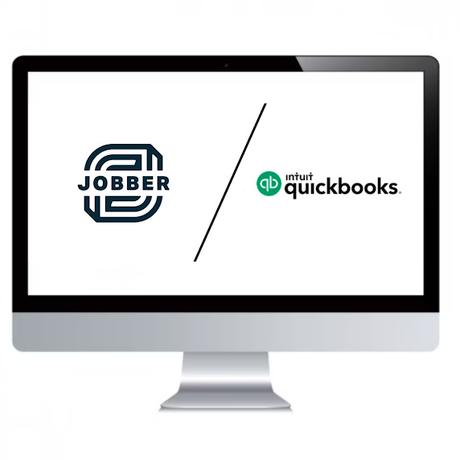Are you a small business owner struggling to choose between Jobber and QuickBooks for accounting? Both software options have their own strengths and weaknesses, making it difficult to determine which one is best suited for your business needs. In this blog post, we will compare the features of both Jobber vs QuickBooks in terms of accounting capabilities, invoicing, bookkeeping, taxes and more. By the end of this article, you'll be able to make an informed decision on whether Jobber or QuickBooks is the better option for your business!

Jobber vs QuickBooks Comparison
Jobber and QuickBooks are two popular software options for small businesses. Jobber is specifically designed for field service management, while QuickBooks is a comprehensive accounting tool that offers invoicing, bookkeeping, payroll processing, and tax preparation functionalities.
When it comes to pricing, both Jobber vs QuickBooks have tiered plans with varying features and prices. However, Jobber's pricing is more straightforward compared to the complicated tier system of QuickBooks.
In terms of user-friendliness, both software options offer easy-to-use interfaces with simple setups. However, because QuickBooks is a more complex tool that covers various accounting functions beyond service management like inventory tracking or budgeting tools; has a steeper learning curve than Jobber.
Ultimately, when choosing between these two software options, consider your business needs and choose based on what feature set best suits those needs in order to make an informed decision on which option will work best for you!
What is QuickBooks?
QuickBooks is a popular accounting software that helps businesses manage their finances with ease. Developed by Intuit, QuickBooks offers a range of features and tools to manage financial data, including invoicing, expenses tracking, payroll management, and more.
One of the key benefits of QuickBooks is its user-friendly interface that makes it easy for even non-accountants to navigate the software. With its cloud-based platform, users can access financial data from anywhere at any time using any device.
QuickBooks also integrates with other business applications such as CRM systems and payment gateways to streamline processes further. Additionally, QuickBooks provides real-time insights into your financials through customized reports that you can generate easily.
QuickBooks delivers efficient accounting capabilities that help businesses save time and money while providing accurate financial data needed for informed decision-making.
What is Jobber?
Jobber is a cloud-based field service management software designed for small to medium-sized businesses. It was founded in 2011 by Sam Pillar and Forrest Zeisler in Edmonton, Alberta, Canada. Jobber aims to help businesses manage their day-to-day operations efficiently.
One of the key features of Jobber is its scheduling function. The platform allows users to schedule jobs and assign them to their team members with ease. This feature helps business owners keep track of their employees' schedules and ensure that all tasks are completed on time.
Another useful feature of Jobber is its invoicing capabilities. With the platform's built-in invoicing tools, businesses can easily create and send professional-looking invoices to customers. Users can also set up automatic payment reminders which help reduce late payments.
Jobber also offers an online booking form which makes it easy for customers to book appointments directly through a business's website or social media pages. Additionally, the platform provides real-time updates on job progress, allowing both business owners and customers to stay informed about the status of each project.
Jobber is a comprehensive solution for managing field services operations that includes scheduling, invoicing, online booking forms as well as real-time updates on job progress among other features.
Jobber vs QuickBooks: Which is better for accounting?
When it comes to accounting, both Jobber and QuickBooks offer powerful tools for managing your finances. QuickBooks is a full-featured accounting software that can handle all aspects of your business's financial operations. On the other hand, Jobber offers basic bookkeeping features that are integrated with its invoicing and scheduling tools.
QuickBooks provides comprehensive reports on income, expenses, profit and loss statements which allow you to track your financial performance in real-time. It also allows you to generate customizable invoices using pre-built templates or create your own from scratch.
Jobber has limited accounting functionality compared to Quickbooks but its invoicing capabilities remain top-notch. You can track payments, set up recurring billing for clients on retainer or subscription fees while keeping tabs on overdue accounts automatically.
In terms of pricing, Jobber's Starter plan costs $29/month whereas Quickbooks' Simple Start plan starts at $25/month making them both affordable options for small businesses. Ultimately choosing between the two will depend on whether you require advanced accounting features or just need basic bookkeeping functions integrated into a robust suite of job management tools like in Jobber's case.
Jobber vs QuickBooks: Which is better for invoicing?
When it comes to invoicing, both Jobber vs QuickBooks have their own strengths. QuickBooks offers a wide range of customizable invoice templates that can be tailored according to your business needs. The software allows you to create invoices quickly and send them directly from the platform.
Jobber also provides an easy-to-use invoicing system that enables you to create professional invoices in a matter of seconds. You can customize your invoices with your logos, colors, and branding elements, making them look more polished and professional.
In terms of payment processing capabilities, QuickBooks has the edge over Jobber as it supports multiple payment options such as credit cards, bank transfers, and online payments. This feature simplifies the billing process for clients who prefer different payment methods.
On the other hand, Jobber's invoicing system is seamlessly integrated with its scheduling and dispatch features which allow businesses to automate their workflows efficiently. Once a job is completed or scheduled via Jobber’s app or website portal - an invoice will automatically be created.
When comparing both platforms' invoicing capabilities - while each has its respective advantages they are relatively similar in functionality so choosing between one or the other likely won't come down solely on this aspect alone but rather what additional features better fit ones business model
QuickBooks vs Jobber: Which is better for bookkeeping?
When it comes to bookkeeping, QuickBooks and Jobber both offer features that can benefit small business owners. However, there are some key differences between the two platforms.
QuickBooks allows users to track income and expenses by connecting bank accounts and credit cards. It also offers automatic transaction categorization, which saves time on manual data entry. QuickBooks also has a robust reporting feature that can provide insights into profits and losses.
On the other hand, Jobber's bookkeeping capabilities are more focused on tracking customer information and job details. This includes recording payments received from customers for completed jobs as well as tracking outstanding balances for unpaid invoices.
While QuickBooks may be better suited for businesses with complex financial needs, Jobber is ideal for service-based companies looking to organize customer information alongside their accounting records.
Ultimately, choosing between QuickBooks or Jobber for bookkeeping will depend on your specific business needs. It’s important to evaluate each platform’s strengths in order to make an informed decision that will help streamline your financial management processes.
QuickBooks vs Jobber: Which is better for taxes?
When it comes to taxes, both QuickBooks and Jobber have their own unique strengths. However, there are some differences that might make one better suited for your business depending on your tax needs.
QuickBooks has a robust set of tax features that allow you to track sales tax rates and automate the calculation of taxes owed. Additionally, it integrates with TurboTax so you can easily export data at tax time. For businesses with more complex tax structures or those who need detailed reporting for audits, QuickBooks may be the way to go.
On the other hand, Jobber doesn't offer as many specific tax features but does provide customizable reports that can help you keep track of expenses and income throughout the year. This could be particularly useful for freelancers or small businesses with straightforward tax situations who want a simpler solution.
Ultimately, which software is better for taxes depends on your specific needs and preferences. Consider what features are most important to you when it comes to managing your finances come tax season before making a decision between QuickBooks vs Jobber.
Conclusion
After comparing Jobber vs QuickBooks, it's clear that both software offer excellent accounting capabilities. However, choosing the right one depends on your business needs.
QuickBooks is a great option for small businesses seeking robust bookkeeping features with powerful integrations. On the other hand, Jobber offers an all-in-one solution for service-based industries needing invoicing and scheduling tools along with basic accounting functions.
Before making your decision, consider what features are most important to you and which software aligns best with your specific business needs. Ultimately, choosing between Jobber vs Quickbooks comes down to finding which tool will help you save time, money, and headaches in managing your finances.

